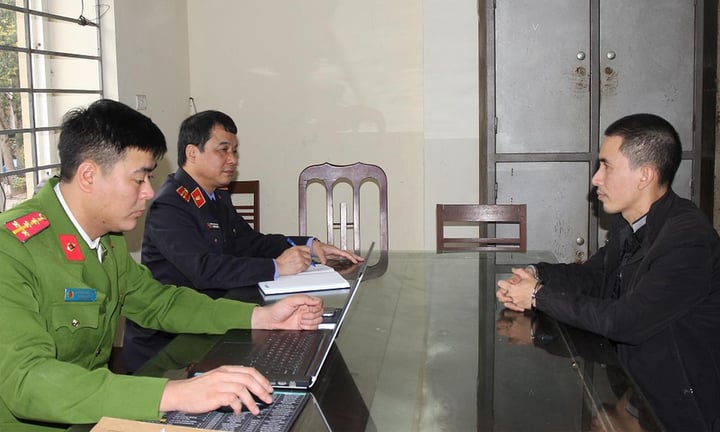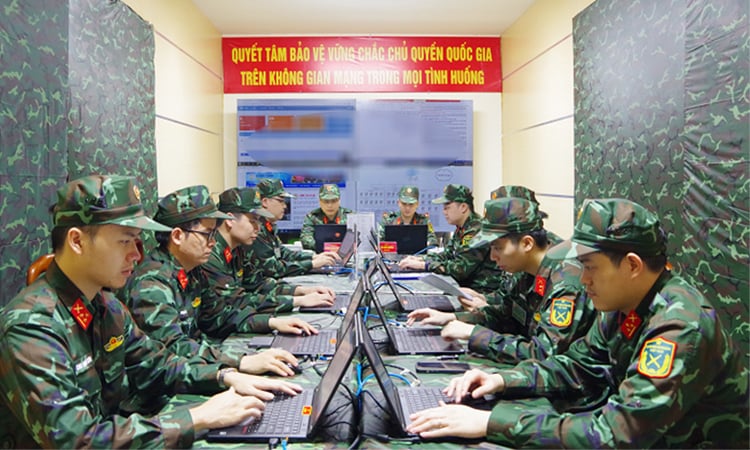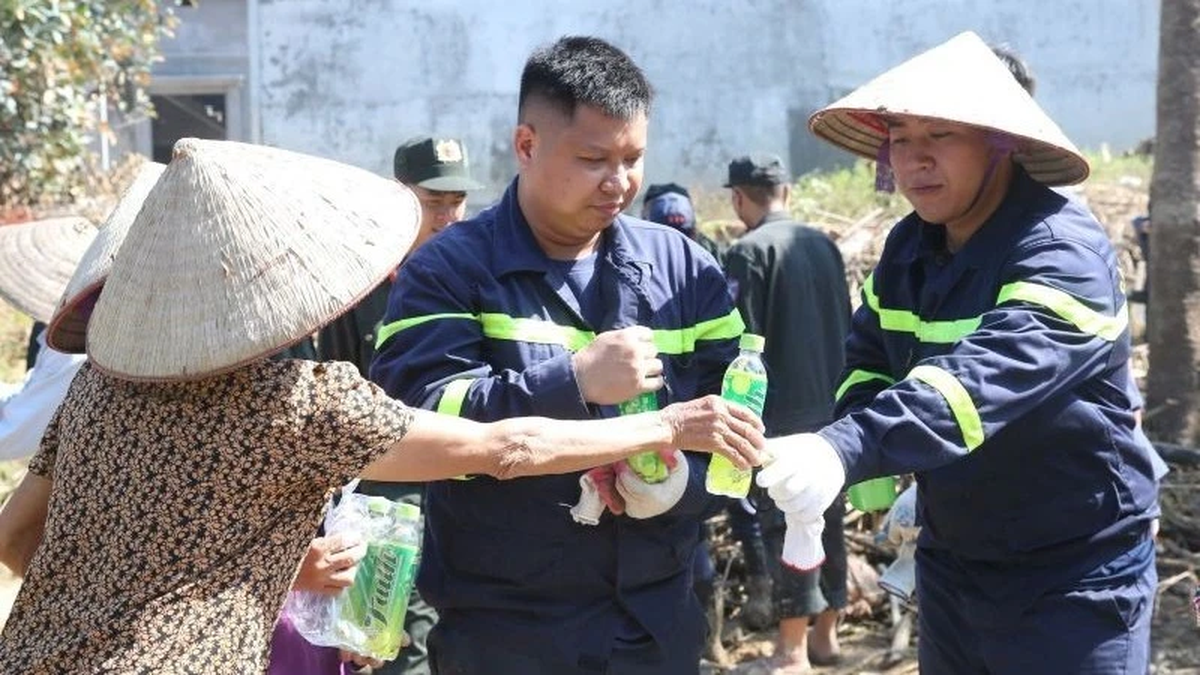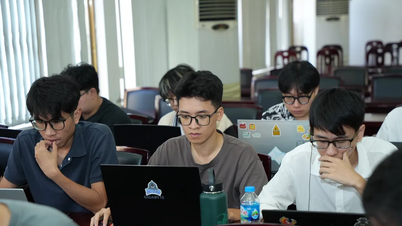In the context of Vietnam promoting digital transformation in all fields, cybersecurity has become a strategic pillar, playing an essential role in ensuring sustainable and stable development of the country, protecting national sovereignty in cyberspace and the legitimate rights of all organizations and individuals.
However, the current reality is posing serious challenges. Fraudulent appropriation of assets online, distorting information, defaming the reputation of individuals and organizations on cyberspace is widespread and increasingly serious, directly threatening national security and order.
On September 20, 2024, the Prime Minister signed Decision No. 1013/QD-TTg to designate August 6 every year as Vietnam Cyber Security Day, demonstrating the determination to raise awareness and action across society in response to this problem. This requires managers, experts, scientists and media agencies... to have a comprehensive view and propose synchronous and drastic solutions to push back the alarming situation in cyberspace.
Ha Nam Provincial Police take statements from online fraud suspects. (Photo: Ha Nam Police)
Alarming situation and damage caused by cybercrime
The situation of cybercrime in Vietnam is becoming extremely complicated, causing huge losses. According to the 2024 cybersecurity survey report of the National Cyber Security Association, 1 in 220 smartphone users is a victim of online fraud, with estimated losses in 2024 reaching VND18,900 billion (about USD740 million).
This huge number is a warning bell about the loss of people's assets as well as the risk of hindering the development of Vietnam's digital economy. The prevalence of the problem is demonstrated by the rate of about 0.45% of internet users becoming victims of fraud - showing that cybercrime can reach all classes and ages from urban to rural areas. The damage they cause is not only economic, but also erodes public trust in digital services, hindering the goal of national digital transformation.
Official statistics show that cyber attacks are increasing alarmingly. In 2023, Vietnam recorded about 13,900 attacks on information systems, an average of 1,160 per month, an increase of 9.5% compared to 2022. Attack targets are very diverse, often focusing on key systems such as government agencies, banks, financial institutions, industries...
Notably, 554 websites of government and educational agencies (domain names gov.vn, edu.vn) were hacked and inserted with gambling advertising malware. In addition, more than 83,000 computers and servers in Vietnam were infected with ransomware in 2023, an increase of 8.4% compared to 2022. Attacks on important information systems not only cause financial losses but also threaten national security and disrupt essential public services. This situation requires strong, multi-layered defense strategies to protect critical digital infrastructure.
The damage at the individual level is also extremely serious. In Ho Chi Minh City, in the first 9 months of 2024 alone, the City Police received and handled 461 cases of cyber fraud with a total loss of about 982 billion VND. On average, each case cost victims about 5 billion VND - a shocking figure, showing the huge financial devastation to individuals and families.
The consequences are not only loss of money, but also psychological trauma, family conflicts, and even in some cases, suicide. The above figures and consequences show that cybercrime has become a serious problem, deeply affecting the economy and society.
Cybercrime methods are increasingly sophisticated and varied.
Cybercriminals are constantly "changing their forms" with increasingly sophisticated scam scenarios. Experts say that since 2024, although no completely new scam methods have appeared, criminals have continuously drawn up different scenarios, customized for each victim.
They carefully study each person's psychology to "measure and tailor" their scamming tactics, showing great professionalism and adaptability. The fact that criminals can adjust the scenario to each individual shows a deep understanding of human psychology and the ability to exploit weaknesses in a sophisticated way.
Common financial scams today include: inviting investment in stocks, virtual currencies, foreign exchange with promises of "huge" profits; impersonating police, prosecutors, courts, tax, electricity, post offices, etc., calling to inform victims about the case and requesting money transfer to a "safe account" to prove innocence; hijacking social network accounts to pretend to be relatives to borrow money urgently; or offering travel combo "packages", support for opening online shops, running ads, participating in surveys to receive gifts, etc. to entice victims to provide information or deposit money to receive commissions.
In particular, criminals have taken advantage of Deepfake technology and artificial intelligence (AI) to create fake videos and sounds of relatives with real-like images and voices to borrow money or create emergency situations (accidents, emergencies) to defraud. Deepfake videos have high accuracy, making it difficult for victims to distinguish between real and fake and easy to be psychologically manipulated.
Criminals are taking full advantage of technological advances such as AI and Deepfake, increasing the persuasiveness of scams, making it easy for anyone to fall into the trap if they are not vigilant.
In addition to financial goals, acts of distortion, defamation, and spreading fake news on cyberspace are also widespread. Bad and reactionary elements have posted tens of thousands of fake news and bad, toxic content on social networks: more than 95,000 posts on Facebook, 50,000 videos on YouTube, 30,000 pieces of content on TikTok with false content, defaming leaders, distorting Party and State policies, and undermining national unity.
This harmful information causes public confusion, seriously affects the reputation of organizations and individuals, and threatens security and order. Minister of Public Security Luong Tam Quang warned that the consequences of fake news and false information are unpredictable, causing many serious consequences, even becoming a major threat to the socio-economy and directly threatening national sovereignty as well as global security.
Obviously, cyberspace is not only a "promised land" for making illegal money, but also an ideological battlefield where bad forces take advantage to sabotage.
The common point of all scam scenarios is that they all play on human psychology - exploiting the greed, fear, and curiosity of the victim. High-tech criminal gangs operate very professionally, with specialized divisions, even operating like businesses with their own offices and script research departments. The "modernization" of cybercrime makes the prevention and combat work of the authorities face many difficulties.
This reality requires public awareness campaigns to focus on training critical thinking, information verification skills and identifying psychological manipulation, rather than just listing specific types of scams. Every internet user needs to be equipped with a mental “vaccine” to immunize themselves against increasingly sophisticated scams.
Challenges in combating cybercrime
Vietnamese authorities are facing many major challenges in the fight against cybercrime:
Cross-border and anonymous nature: The borderless cyberspace allows criminals to operate from anywhere, overcoming geographical and national legal barriers. Many international criminal gangs connect with domestic subjects to commit fraud. In particular, there has been a situation where foreign criminals collude and lure Vietnamese people to Cambodia to operate high-tech fraud lines under the guise of "easy work, high salary".
This increases the complexity of investigations, requiring close international cooperation. Meanwhile, Vietnam and many ASEAN countries still lack a common legal corridor to keep up with the rapid changes of transnational cybercrime, making it difficult to coordinate handling.
Limited resources and human resources: The capacity and resources to prevent cybercrime in the country are still inadequate. The most worrying is the shortage of high-quality human resources in the field of cyber security. Vietnam currently does not have many world-class experts, and lacks leading talents in core technologies such as cyber security, AI, cloud computing, machine learning, etc.
According to forecasts, Vietnam may lack more than 700,000 specialized personnel in cybersecurity in the coming years - a major "gap" in human resources. This shortage directly affects the ability to proactively detect, analyze and respond to increasingly sophisticated cyber threats. The incident response capacity of many domestic agencies and organizations is still limited; when attacked by cyber attacks, the quick response process to minimize damage is often confused, leading to many units suffering great losses and continuing to be threatened in the future.
Information management and investigation loopholes: The situation of junk SIM cards and illegal trading of bank accounts is still widespread, aiding cybercriminals. Subjects can easily use non-owner SIM cards and “virtual” bank accounts to hide their identity, seriously hindering the process of tracing and investigating crimes.
In addition, the shared database system between functional forces on cybercrime still has many shortcomings; data has not been standardized and connected smoothly, reducing the effectiveness of coordination between units. This is a bottleneck that needs to be overcome soon to improve the effectiveness of the fight.
People's awareness and vigilance: Although the mass media and authorities have continuously warned and propagated, many people still fall into the trap of fraud. The main reason is that the victims lack knowledge, lose vigilance and are gullible, while the criminals are very professional and sophisticated. The subjects constantly change the scenario, use psychological manipulation techniques, and play on "greed, fear, and curiosity", making it difficult for many people to recognize new tricks.
In particular, groups of people with little access to technology and lacking digital skills (such as the elderly, children, housewives, etc.) are more likely to become victims. Raising awareness and self-defense skills for the community is therefore a challenge and also a key to reducing the number of victims in the future.
The above challenges show that the fight against cybercrime is a long-term and complex one. To gain the upper hand in cyberspace, we need a comprehensive and synchronous system of solutions, mobilizing the combined strength of the entire political system, specialized forces and the entire population.
Perfecting the law and strengthening state management
Completing the legal framework is an important foundation for effectively controlling and handling cybercrime. In the face of many new risks and challenges (typically personal data leaks and online fraud), the early promulgation of the Law on Cyber Security (amended) or related legal documents is very urgent.
Currently, the Government is drafting a new Cybersecurity Law based on the consolidation of the 2015 Cybersecurity Law and the 2018 Cybersecurity Law, in order to overcome conflicts and overlaps in implementation. The legal system needs to be unified and updated promptly to accommodate the rapid changes in cybercrime.
Besides, Vietnam also needs to promote the building of common legal frameworks with other countries to create a basis for coordination in investigating and handling cross-border crimes.
Along with perfecting the law, it is necessary to enhance the leadership role of the Party and the management role of the State in ensuring security and order in cyberspace. This is demonstrated through centralized and unified direction from the central government and close coordination between ministries and functional branches.
In particular, the Ministry of Public Security needs to play a core role, taking the lead in responding to serious cyber security threats, while guiding other ministries and sectors in handling non-traditional security risks in their fields. As evidence of this effort, at the end of 2023, the Ministry of Public Security and the Ministry of Science and Technology signed a Coordination Regulation to strengthen unified direction in protecting national security, social order and safety, and fighting crimes in the field of information and communications.
A breakthrough solution in State management is to promote the application of electronic identification accounts (VNeID) as "cyber identity cards" to authenticate user identities. This will help clean up data and limit the anonymous activities of criminals.
At the same time, it is necessary to connect the electronic identification system with the National Population Database to quickly verify information and eliminate virtual accounts and junk SIMs. When identities in the online environment are guaranteed to be transparent, criminals will find it difficult to hide, thereby minimizing favorable conditions for them to operate.
In addition, the State needs to enhance the responsibility of social media platforms in controlling content. Cross-border platforms such as Facebook, Google, TikTok... must strictly comply with Vietnamese law, prevent and remove false and harmful information when requested by authorities.
The Ministry of Culture, Sports and Tourism has recently coordinated a strong but flexible fight with these platforms, forcing them to clearly stipulate that users are not allowed to post fake news, baseless rumors or distort the truth. This is a measure that needs to be maintained to bind the legal responsibility of social network service providers, contributing to a clean information environment.
Improving the capacity of specialized forces and modernizing cyber security defenses
To effectively deal with increasingly sophisticated cybercrime, it is extremely necessary to consolidate and modernize specialized forces. The People's Public Security Force needs to continue to be built in a disciplined, elite, modern direction, capable of playing the core role in preventing high-tech crime.
Currently, the Department of Cyber Security and High-Tech Crime Prevention - A06 (Ministry of Public Security) has achieved many important achievements in the fight against cybercrime, and was awarded the Emulation Flag for Excellent Unit in 2023 by the Government, demonstrating the effectiveness of its practical operations.
Similarly, the Cyber Warfare Command (Ministry of National Defense) - also known as Command 86, although only established in 2017 - has quickly matured, asserting its role as a combat force on the non-traditional front, firmly protecting national sovereignty in cyberspace. This unit is striving to build a "model, typical" team in terms of bravery, intelligence, ready to operate in a new environment, meeting the requirements of national defense and security tasks in the digital age.
Forces of Center 186, Command 86 participate in an exercise on information security and protecting national sovereignty in cyberspace. (Photo: People's Army Newspaper)
Investing in developing high-quality human resources for specialized forces should be given top priority. It is necessary to strengthen training and improve the qualifications of officers and soldiers in cutting-edge technology fields such as cyber security, artificial intelligence, big data, etc.; at the same time, promote international cooperation and training links with leading countries and technology corporations to acquire new knowledge and share experiences in protecting cyber security.
At the same time, modernizing equipment and technology for law enforcement forces is an urgent requirement. Specialized units under the Ministry of Public Security (such as Department A05), the Ministry of National Defense (Command 86), the Ministry of Science and Technology (NCSC Center)... need to be given priority in equipping themselves with advanced security solutions: from data encryption systems, firewalls, anti-virus software to modern intrusion detection tools (IDS/IPS). The application of strong authentication technologies such as two-factor authentication (2FA) should be popularized to prevent the risk of unauthorized access.
Along with that, it is necessary to develop network monitoring and investigation systems capable of early detection and rapid response to attacks. The network of network security operations centers (SOC) needs to be expanded, connecting from central to local levels. The National Cyber Security Monitoring Center (NCSC) must play a leading role in monitoring, warning and supporting agencies and businesses.
In recent times, NCSC has continuously received feedback from people, promptly warning about common scam scenarios (such as impersonating police officers, impersonating bank employees, post offices, etc.) to help people raise their vigilance. In April 2022, NCSC even collaborated with Google to launch the website "Signs of fraud" (dauhieuluadao.com) to provide typical scam situations and "golden rules" for self-protection for internet users.
Such efforts should be sustained and expanded. In addition to monitoring, the task force should also promote scientific research on cyber security. Establishing strong research centers on non-traditional security in the police and military forces will help us master technology and be more proactive in defending and counter-attacking in cyberspace.
Strengthen propaganda and education to raise public awareness
Along with technical solutions and legal sanctions, the work of propagating and disseminating knowledge about cyber security to the community needs to be promoted more than ever. Communication programs must be organized regularly and continuously, with rich content and form, easy to understand, suitable for each target group.
In particular, priority should be given to propaganda in remote areas where people have limited information and digital skills. Educational content focuses on updating new methods and tricks of cybercrime; providing skills to recognize and prevent fraud; and disseminating legal knowledge on information security.
Raising personal awareness is central to this work. Individuals need to be given specific instructions on how to protect personal information (such as not posting sensitive information on social media), how to use strong passwords and enable 2FA, as well as skills to verify news before sharing.
Internet users should never provide OTP codes or passwords to anyone who has not verified their identity; be wary of attractive offers like “easy work, high salary” or promises of unreasonable profits. These “golden” principles need to be emphasized to form self-protection habits for each individual.
In particular, to effectively deal with fake news, it is necessary to build a network to detect and handle bad and toxic news from the central to local levels. It is recommended to establish centers to handle fake news and bad and toxic news in each locality, linked with the central level, to proactively detect and quickly respond to the flow of false information.
Press and media agencies play a pivotal role in this: key press agencies such as VOV, VTV, VNA, Nhan Dan Newspaper... need to promote their "leading" role - continuously providing official information, guiding public opinion, exposing fraudulent and distorted tricks, thereby spreading early warnings to the people.
In fact, the mainstream press has long been a mainstream information channel contributing to social orientation. In 2023, the Ministry of Justice signed a coordination program with VNA, VTV, and VOV in communicating and disseminating legal education nationwide. In the field of cybersecurity, the strong participation of national press agencies will help raise public awareness in a broad way, creating "immunity" against fake news and scams.
At the same time, it is necessary to enhance the social responsibility of internet and telecommunications service providers in warning customers and supporting the removal of fraudulent content when reported.
Strengthening international cooperation and inter-sectoral coordination
In the fight against cybercrime, international cooperation is vital. Vietnam needs to actively participate and coordinate with countries, international and regional organizations on cyber security to share information, experience, support human resource training and coordinate the suppression of cross-border crimes. In recent years, Vietnam has proactively cooperated with many partners (US, EU, Korea, Israel...) in exchanging experts and receiving technical support on information security.
However, it is necessary to go further by promoting the development of agreements and common legal mechanisms with other countries to create a legal framework for the investigation and extradition of international cybercrimes. Multilateral forums such as the United Nations, ASEAN, the Global Cyber Security Forum, etc. are opportunities for Vietnam to contribute its voice, propose initiatives and seek consensus on a safe and healthy cyberspace.
In the country, close inter-sectoral coordination is a prerequisite for creating a comprehensive strength. No single ministry or sector can solve all cybersecurity issues on its own, so it requires the cooperation of all relevant agencies. The Ministry of Public Security, the Ministry of National Defense, the Ministry of Science and Technology, the Ministry of Culture, Sports and Tourism, the State Bank, etc. and localities must establish a mechanism for regular coordination, data sharing, and professional support for each other.
Currently, the Ministry of Public Security, in its standing role, has proactively advised and guided other sectors in dealing with cyber threats related to their fields (economics, finance, culture, health, etc.).
On the contrary, ministries and branches need to proactively coordinate internally: for example, strengthen the connection between cyber security forces and economic security forces, internal political security... to promptly detect and handle related risks. The recent signing of coordination regulations such as the one between the Ministry of Public Security and the Ministry of Science and Technology is a positive signal, which needs to be replicated in other pairs of ministries and branches.
Ultimately, the decisive factor is still mobilizing the combined strength of the entire political system and the entire population. Preventing cybercrime is not only the task of the police force or information technology experts, but also requires the participation of each party committee, government and each citizen. The movement "All people protect national security" needs to be consolidated and promoted in the new conditions - each citizen should consider themselves a "soldier" on the cyberspace front, actively denounce criminals, warn the community and voluntarily comply with regulations on cyber security.
Only with the joint efforts from the central to the grassroots level can we build a safe and healthy cyberspace that effectively serves the country's sustainable development.
Conclusion and recommendations
The situation of cybercrime in Vietnam is at a red alert level with a myriad of fraudulent tricks, distortions, causing huge economic losses and deeply affecting social life, the reputation of organizations, individuals as well as national security. The constant transformation of tricks - from taking advantage of Deepfake and AI technology to thoroughly exploiting the anonymity and cross-border nature of the internet - makes the fight against this type of crime face great challenges in terms of law, resources and public awareness. The birth of Vietnam Cyber Security Day on August 6 is an opportunity for the whole society to see the situation more clearly and join hands to take action.
To effectively combat cyberspace problems, it is necessary to synchronously deploy the following key solutions:
Perfecting the legal framework: Continue to build and perfect the legal system on cyber security, especially speed up the consolidation of related laws to create a tight, timely, and practical legal corridor. Strengthen State management measures in cyberspace, such as applying electronic identification to authenticate identities, clean user data, and limit the anonymous activities of criminals.
Improve professional capacity, modernize the force: Invest heavily in training high-quality human resources in the fields of cyber security, artificial intelligence, and big data analysis. Modernize equipment and technology for specialized forces (A05 Department - Ministry of Public Security, Command 86 - Ministry of National Defense, National Cyber Security Monitoring Center, etc.), and develop advanced network monitoring and investigation systems.
Strengthening propaganda and community education: Innovating and promoting propaganda and education on methods and tricks of fraud and distortion in cyberspace. Promoting the vanguard role of key national press agencies (VOV, VTV, VNA, Nhan Dan Newspaper...) in orienting public opinion and spreading cybersecurity warnings.
Raise awareness and equip people with self-protection skills, especially vulnerable groups (the elderly, young people, and people with little knowledge of technology). Build and operate a fake news processing network from central to local levels to promptly detect and prevent bad and toxic news.
Promote international and inter-sectoral cooperation: Strengthen international cooperation in preventing cross-border cybercrime, sharing information, technical support and practical experience. Promote close coordination between the Ministry of Public Security, the Ministry of Science and Technology, the Ministry of National Defense and other ministries, sectors and localities to create a combined strength in this fight.
Enhance the responsibility of digital platforms: Require cross-border and domestic social networking platforms to strictly comply with Vietnamese laws on content control; proactively prevent and remove false, distorted, and slanderous information when requested. At the same time, impose strict sanctions on platforms that do not cooperate or allow violations to occur for a long time.
Only with the synchronous participation of the entire political system, the determination of functional forces, the initiative of technology enterprises and the vigilance of the entire population, can we build a safe and healthy cyberspace that effectively serves the sustainable development of the country.
Dr. Vu Hai Quang (Deputy General Director of VTV)
Source: https://vtcnews.vn/an-ninh-mang-viet-nam-thuc-trang-va-giai-phap-ar958051.html





![[Photo] Closing ceremony of the 18th Congress of Hanoi Party Committee](https://vphoto.vietnam.vn/thumb/1200x675/vietnam/resource/IMAGE/2025/10/17/1760704850107_ndo_br_1-jpg.webp)
![[Photo] General Secretary To Lam attends the 95th Anniversary of the Party Central Office's Traditional Day](https://vphoto.vietnam.vn/thumb/1200x675/vietnam/resource/IMAGE/2025/10/18/1760784671836_a1-bnd-4476-1940-jpg.webp)
![[Photo] Collecting waste, sowing green seeds](https://vphoto.vietnam.vn/thumb/1200x675/vietnam/resource/IMAGE/2025/10/18/1760786475497_ndo_br_1-jpg.webp)
![[Photo] Immerse yourself in the colorful musical world of “Secret Garden Live in Vietnam”](https://vphoto.vietnam.vn/thumb/1200x675/vietnam/resource/IMAGE/2025/10/18/1760805978427_ndo_br_thiet-ke-chua-co-ten-41-png.webp)






























































































Comment (0)